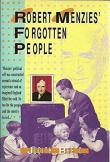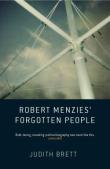AustLit
Latest Issues
AbstractHistoryArchive Description
'In 1941, RG Menzies delivered to war-time Australia what was to be his richest, most creative speech, and one of his most influential. 'The Forgotten People' was a direct address to the Australian middle class, the "people" who would return him to power in 1949 and keep him there until his retirement in 1966.
'Who were these "forgotten people"? The middle class pitting their values of hard work and independence against the collectivist ethos of labour? Women, shunning the class-based politics of men? The parents of Menzies' childhood in the small country town of Jeparit? Australians struggling to maintain a derivative culture at the edges of the British Empire? Or all of them, in a richly over-determined image that takes us to the heart of Menzies' mid-life political transformation?
'Judith Brett deftly traces the links between the private and public meanings of Menzies' political language to produce compelling insights into the man and the culture he represented.' (Publisher's blurb)
Notes
-
Brett's biography of Menzies, while focussing on his political career, includes details of Menzies' literary influences and the poetry he wrote as a young man. See particularly 'Literary Aspirations', pp.152-158 (2nd. ed.).
Publication Details of Only Known VersionEarliest 2 Known Versions of
Works about this Work
-
Landmark Histories : Response by Judith Brett
2023
single work
criticism
— Appears in: History Australia , vol. 20 no. 3 2023; (p. 435-437)'It is very gratifying to have Robert Menzies’ Forgotten People included in History Australia’s Landmarks series, and I thank the editors for the honour and Sybil Nolan for her thoughtful discussion of the book and its reception. I thank her too for publishing a second edition in 2007 with Melbourne University Press which has kept the book in print. I wrote a long introduction to this second edition, in which I reflected on the book’s origins in a course I was teaching on political parties at the University of Melbourne in 1980. Back then, I was looking for readings on the Liberal Party – its history, what it stood for and the reasons for its electoral success. Everything I found was from the left, describing the party as a vehicle for capital and the ruling class. I wanted something from inside, which captured the party’s self-understandings, when I found a copy of Menzies’ 1942 radio broadcast, ‘The Forgotten People’, in the basement of the Baillieu Library. I had just finished my PhD on the fin-de-siècle Austrian writer, Hugo von Hofmannsthal, which used a close reading of Hofmannsthal’s writing to develop a psycho-biographical argument about his transition from a gifted young lyric poet to Richard Strauss’s librettist. I was good at close reading, and I started to apply my skill to Menzies’ broadcast, mostly to the ‘Forgotten People’ broadcast itself but also to other of his writing, including his occasional verse.' (Publication abstract)
-
Robert Menzies’ Forgotten People and the Meaning of 1992
2023
single work
criticism
— Appears in: History Australia , vol. 20 no. 3 2023; (p. 417-434)'This article investigates the reception of Judith Brett’s landmark study, Robert Menzies’ Forgotten People, on its publication in 1992, a moment when many Australians living under neoliberal economic reform and recession were rethinking what it meant to be middle class. Brett argued that Menzies thought it meant individuals living the best lives they could, lives defined by independence and the possession of superior moral qualities. Her account resonated with contemporary Australian experience and remains highly influential. Yet within political history, reviews were mixed as traditionalists resisted the psychoanalytic theory Brett employed to understand Menzies’ public language. Her strategic defence of her interdisciplinary approach has ultimately helped to keep the idea of moral liberalism alive in political discourse.' (Publication abstract)
-
Australia in Three Books
2022
single work
review
— Appears in: Meanjin , September vol. 81 no. 3 2022; (p. 26-29)
— Review of Recollections of a Bleeding Heart : A Portrait of Paul Keating PM 2002 single work biography ; Robert Menzies' Forgotten People 1992 single work biography ; The Game : A Portrait of Scott Morrison 2021 single work biography -
Menzies and Howard on Themselves : Liberal Memoir, Memory and Myth Making
2018
single work
criticism
— Appears in: History Australia , vol. 15 no. 1 2018; (p. 7-22)'This article compares the memoirs of Sir Robert Menzies and John Howard, as well as Howard’s book on Menzies, examining what these works by the two most successful Liberal prime ministers indicate about the evolution of the Liberal Party’s liberalism. Howard’s memoirs are far more ‘political’, candid and ideologically engaged than those of Menzies. Howard acknowledges that politics is about political power and winning it, while Menzies was more concerned with the political leader as statesman. Howard’s works can be viewed as a continuation of the ‘history wars’. He wishes to create a Liberal tradition to match that of the Labor Party.' (Publication abstract)
-
Menzies Worth Another Look
2007
single work
review
— Appears in: The Sydney Morning Herald , 4-5 August 2007; (p. 33)
— Review of Robert Menzies' Forgotten People 1992 single work biography
-
Menzies Worth Another Look
2007
single work
review
— Appears in: The Sydney Morning Herald , 4-5 August 2007; (p. 33)
— Review of Robert Menzies' Forgotten People 1992 single work biography -
Primal Scene from Psycho-Biography
1993
single work
review
— Appears in: Arena Magazine , April/May no. 4 1993; (p. 46-49)
— Review of Robert Menzies' Forgotten People 1992 single work biography ; Hawke : An Emotional Life 1991 single work biography -
Australia in Three Books
2022
single work
review
— Appears in: Meanjin , September vol. 81 no. 3 2022; (p. 26-29)
— Review of Recollections of a Bleeding Heart : A Portrait of Paul Keating PM 2002 single work biography ; Robert Menzies' Forgotten People 1992 single work biography ; The Game : A Portrait of Scott Morrison 2021 single work biography -
Menzies and Howard on Themselves : Liberal Memoir, Memory and Myth Making
2018
single work
criticism
— Appears in: History Australia , vol. 15 no. 1 2018; (p. 7-22)'This article compares the memoirs of Sir Robert Menzies and John Howard, as well as Howard’s book on Menzies, examining what these works by the two most successful Liberal prime ministers indicate about the evolution of the Liberal Party’s liberalism. Howard’s memoirs are far more ‘political’, candid and ideologically engaged than those of Menzies. Howard acknowledges that politics is about political power and winning it, while Menzies was more concerned with the political leader as statesman. Howard’s works can be viewed as a continuation of the ‘history wars’. He wishes to create a Liberal tradition to match that of the Labor Party.' (Publication abstract)
-
Robert Menzies’ Forgotten People and the Meaning of 1992
2023
single work
criticism
— Appears in: History Australia , vol. 20 no. 3 2023; (p. 417-434)'This article investigates the reception of Judith Brett’s landmark study, Robert Menzies’ Forgotten People, on its publication in 1992, a moment when many Australians living under neoliberal economic reform and recession were rethinking what it meant to be middle class. Brett argued that Menzies thought it meant individuals living the best lives they could, lives defined by independence and the possession of superior moral qualities. Her account resonated with contemporary Australian experience and remains highly influential. Yet within political history, reviews were mixed as traditionalists resisted the psychoanalytic theory Brett employed to understand Menzies’ public language. Her strategic defence of her interdisciplinary approach has ultimately helped to keep the idea of moral liberalism alive in political discourse.' (Publication abstract)
-
Landmark Histories : Response by Judith Brett
2023
single work
criticism
— Appears in: History Australia , vol. 20 no. 3 2023; (p. 435-437)'It is very gratifying to have Robert Menzies’ Forgotten People included in History Australia’s Landmarks series, and I thank the editors for the honour and Sybil Nolan for her thoughtful discussion of the book and its reception. I thank her too for publishing a second edition in 2007 with Melbourne University Press which has kept the book in print. I wrote a long introduction to this second edition, in which I reflected on the book’s origins in a course I was teaching on political parties at the University of Melbourne in 1980. Back then, I was looking for readings on the Liberal Party – its history, what it stood for and the reasons for its electoral success. Everything I found was from the left, describing the party as a vehicle for capital and the ruling class. I wanted something from inside, which captured the party’s self-understandings, when I found a copy of Menzies’ 1942 radio broadcast, ‘The Forgotten People’, in the basement of the Baillieu Library. I had just finished my PhD on the fin-de-siècle Austrian writer, Hugo von Hofmannsthal, which used a close reading of Hofmannsthal’s writing to develop a psycho-biographical argument about his transition from a gifted young lyric poet to Richard Strauss’s librettist. I was good at close reading, and I started to apply my skill to Menzies’ broadcast, mostly to the ‘Forgotten People’ broadcast itself but also to other of his writing, including his occasional verse.' (Publication abstract)





